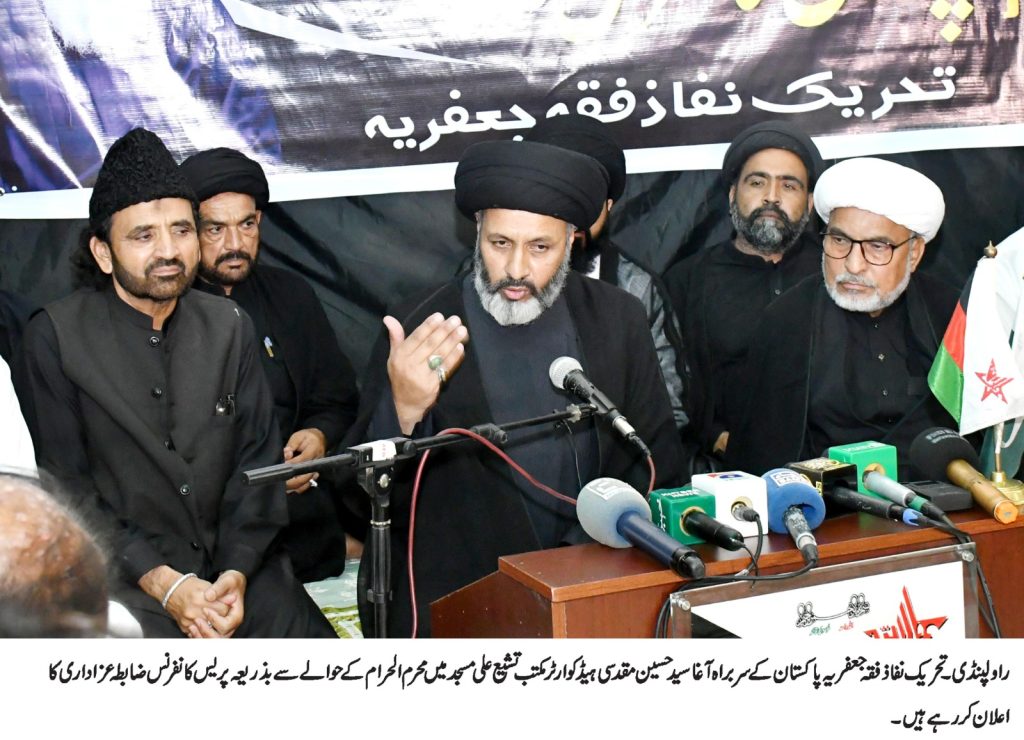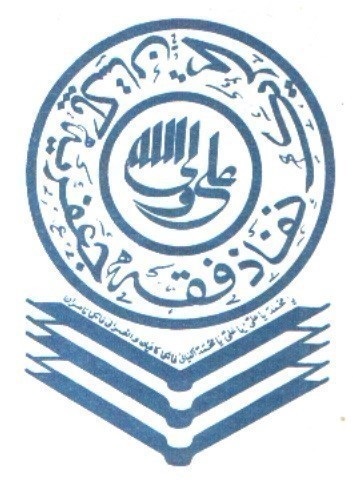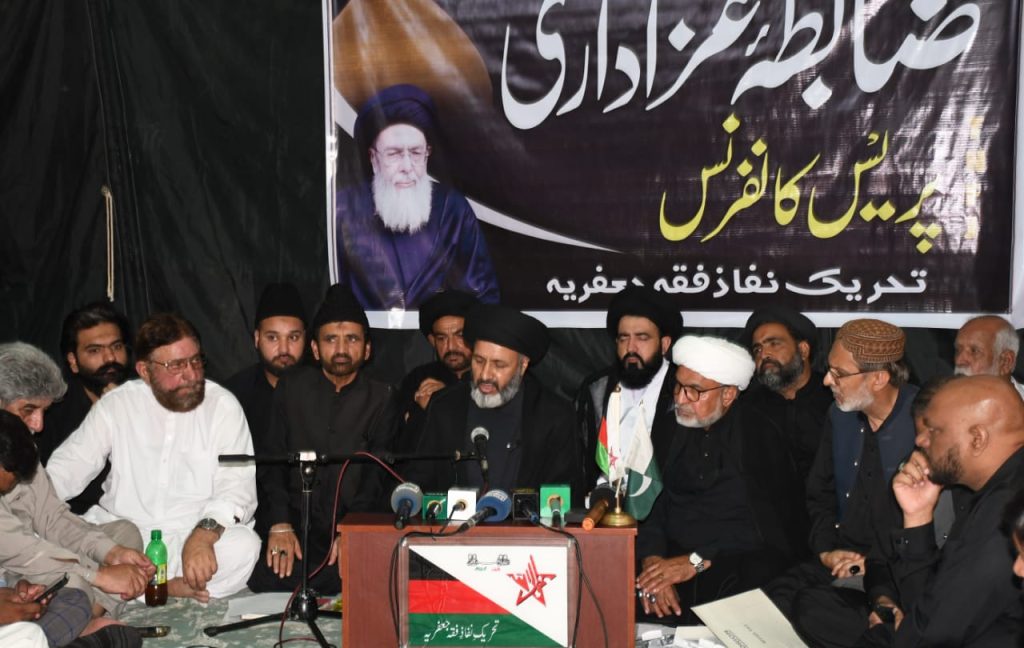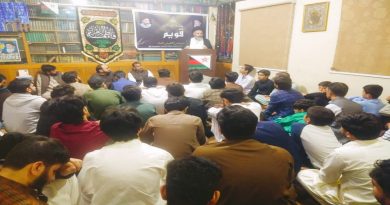TNFJ Chief Announces Code of Azadari for Ayyam-e-Aza-e-Hussaini (1st Muharram – 8th Rabiulawwal 1446 Hijree)
The Chief of Tehrik-e-Nifaz-e-Fiqh-e-Jafariya (TNFJ) Pakistan, Allama Agha Syed Hussain Muqaddasi, announced a 16-point Code of Azadari for Muharram-ul-Haram during a crowded press conference held at the TNFJ headquarters, Markaz-e-Maktab-e-Tashayyu Ali Masjid. He emphasized that mourning for Imam Hussain (A.S.) is a divine promise, and that Hazrat Zainab (S.A.) and Imam Zain-ul-Abideen (A.S.) laid the foundation of Azadari, making the remembrance of Hussain (A.S.) an eternal guarantee for the protection of Tawheed (Oneness of God) and Risalat (Prophethood).
He stated that Muharram-ul-Haram is revered across all religions and schools of thought.
The revolution of Karbala aimed to connect the Ummah (Muslim nation) with the path of divine light and guidance. Imam Hussain (A.S.) sacrificed his life in Karbala for the preservation of Islam and human dignity, and redefined life as an embodiment of faith and struggle, teaching us to stand firm against falsehood.
Allama Muqaddasi said that the Pakistani armed forces, inspired by the spirit of Hussainiyat, shattered the pride of the enemy by giving a crushing response to Indian aggression.
He reiterated the truth of Agha Moosavi’s statement that the “three devils” – America, Israel and India pose the greatest threat. If Muslims were united, colonial powers would have been defeated.
He lamented that while Muslim countries like Libya, Yemen, Iraq, Afghanistan, Lebanon and Syria were targeted, other Muslim states remained silent.
Referring to India’s aggression as an extension of the colonial agenda, he said Pakistan Army responded by raising the slogan of “Ya Haider!” and crushed the enemy.
He applauded Iran’s resilience despite prolonged Western sanctions, saying Iran refused to bow to colonial powers, proving that it belongs to the legacy of Haider (A.S.) and the school of Karbala.
Allama Muqaddasi stated that TNFJ is guided by the teachings of Rahbar-e-Tashayyu Agha Syed Hamid Ali Moosavi for promoting peace, security, unity, and solidarity.
He announced the formation of the Central Muharram Committee Azadari Cell, with Allama Basharat Imami as the Convener and Bawa Syed Farzand Ali Shah Kazmi as Deputy Convener.
He appreciated Pakistan’s institutions for dismantling terrorist networks and foiling enemy conspiracies.
While announcing the 16-point Azadari Code, Allama Muqaddasi insisted that mourning processions across the country must be conducted according to the Moosavi-Junejo Agreement.
He demanded that Federal and Provincial governments set up Muharram Control Rooms at national, provincial, district, and tehsil levels for resolving issues, facilitating mourners, and ensuring peace, and that these control rooms be linked with the TNFJ Azadari Cell.
He urged scholars and Zakireen (orators) to convey the message of Hussainiyat positively and prioritize unity and cohesion.
He emphasized the principle: “Hold firm to your beliefs and do not infringe upon others’ beliefs.”
Respect for all religious sects and beliefs must be ensured.
He appealed to media and broadcasters to highlight the sacrifices of Karbala’s martyrs, and to halt music, dramas, and entertainment programs during Ashura.
Proper arrangements for lighting and cleanliness along the routes of majalis and processions must be ensured, and electricity and gas load shedding should be avoided during the events.
He demanded full implementation of the National Action Plan, ban on proscribed groups from rebranding under new names, and a strict crackdown on those who take the law into their hands.
He asked the Punjab Home Department to immediately withdraw the unjust and unconstitutional SOPs restricting Azadari, saying that no regulation should infringe upon citizens’ constitutional rights to religious freedom.
He urged the administration to cooperate with the organizers of majalis and processions.
The organizers, in turn, should ensure safety arrangements and cooperate with law enforcement agencies, using services of volunteers from Mukhtar Force and Ibrahim Scouts.
He called for security in sensitive areas and, if necessary, deployment of the military.
The government should monitor hate speech and incitement on social media and take action against offenders.
No donations for food or drinks (niyaz and sabeel) should be accepted without verification.
Vehicles should be thoroughly searched before entry into mourning areas.
He appealed to political parties to suspend their political activities during Muharram and give priority to the remembrance of Imam Hussain (A.S.).
Names of peaceful and innocent mourners must be removed from Schedule IV of anti-terrorism watchlists.
He stressed that discipline must be maintained at all majalis and processions, and any acts contrary to the spirit of Azadari must be avoided.
He called on organizers to strictly follow the Azadari Code and ensure compliance by others.
He reiterated that processions should be held in line with the Moosavi-Junejo Agreement, and that Muharram Control Rooms at federal and provincial levels must be established and connected with TNFJ’s Azadari Cell.
Scholars should promote the message of Hussain (A.S.) positively and give precedence to unity.
He demanded the Punjab Home Department repeal unconstitutional SOPs on Azadari.
The government must monitor hate spreaders in media, facilitate the remembrance of Imam Hussain (A.S.), and provide relief to mourners.
He warned that the forces of disbelief are united – so Muslims must also act as one nation.
All enemy networks must be dismantled.
TNFJ’s stance is to prioritize Islam and Pakistan.
He expressed dismay that banned elements have made their way into the assemblies, and that Azadari is our fundamental right.
The previous government implemented regulations that created problems in Punjab, while even minorities are protected for their religious ceremonies.
Hence, such SOPs should be abolished.
He reminded that the founder of Pakistan, Quaid-e-Azam, was a Shia, so no one can consider Shias disloyal to the country.
Instead of glorifying controversial figures, true Islamic heroes must be celebrated.
TNFJ has written letters from the President down to provincial levels to resolve issues regarding Azadari.
Responding to questions, Allama Muqaddasi stated that Azadari is being restricted even within homes.
He reiterated the principle that placing restrictions on religious rituals is unacceptable.
He said banning scholars and Zakireen is not the solution, and that such problems arise due to banned groups.
He concluded by reminding that Imam Hussain (A.S.) is not exclusive to one sect or school of thought – he is a hero of all humanity.
Every sect pays tribute to him in its own way.
He appealed once again to the authorities to view Azadari not as a problem, but as a means of attaining divine pleasure, and to facilitate the organizers and mourners with sincerity.
Finally, he declared unequivocally that “Azadari is our jugular vein, honor – any form of restriction on it will never be accepted.”





